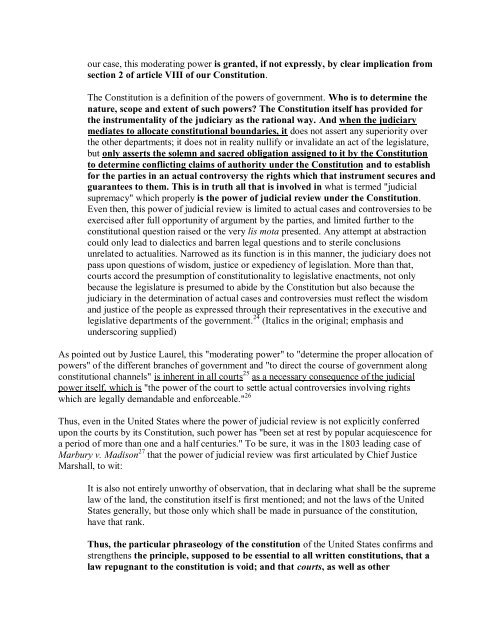Republic of the Philippines SUPREME COURT Manila ... - Columba.us
Republic of the Philippines SUPREME COURT Manila ... - Columba.us
Republic of the Philippines SUPREME COURT Manila ... - Columba.us
You also want an ePaper? Increase the reach of your titles
YUMPU automatically turns print PDFs into web optimized ePapers that Google loves.
our case, this moderating power is granted, if not expressly, by clear implication from<br />
section 2 <strong>of</strong> article VIII <strong>of</strong> our Constitution.<br />
The Constitution is a definition <strong>of</strong> <strong>the</strong> powers <strong>of</strong> government. Who is to determine <strong>the</strong><br />
nature, scope and extent <strong>of</strong> such powers? The Constitution itself has provided for<br />
<strong>the</strong> instrumentality <strong>of</strong> <strong>the</strong> judiciary as <strong>the</strong> rational way. And when <strong>the</strong> judiciary<br />
mediates to allocate constitutional boundaries, it does not assert any superiority over<br />
<strong>the</strong> o<strong>the</strong>r departments; it does not in reality nullify or invalidate an act <strong>of</strong> <strong>the</strong> legislature,<br />
but only asserts <strong>the</strong> solemn and sacred obligation assigned to it by <strong>the</strong> Constitution<br />
to determine conflicting claims <strong>of</strong> authority under <strong>the</strong> Constitution and to establish<br />
for <strong>the</strong> parties in an actual controversy <strong>the</strong> rights which that instrument secures and<br />
guarantees to <strong>the</strong>m. This is in truth all that is involved in what is termed "judicial<br />
supremacy" which properly is <strong>the</strong> power <strong>of</strong> judicial review under <strong>the</strong> Constitution.<br />
Even <strong>the</strong>n, this power <strong>of</strong> judicial review is limited to actual cases and controversies to be<br />
exercised after full opportunity <strong>of</strong> argument by <strong>the</strong> parties, and limited fur<strong>the</strong>r to <strong>the</strong><br />
constitutional question raised or <strong>the</strong> very lis mota presented. Any attempt at abstraction<br />
could only lead to dialectics and barren legal questions and to sterile concl<strong>us</strong>ions<br />
unrelated to actualities. Narrowed as its function is in this manner, <strong>the</strong> judiciary does not<br />
pass upon questions <strong>of</strong> wisdom, j<strong>us</strong>tice or expediency <strong>of</strong> legislation. More than that,<br />
courts accord <strong>the</strong> presumption <strong>of</strong> constitutionality to legislative enactments, not only<br />
beca<strong>us</strong>e <strong>the</strong> legislature is presumed to abide by <strong>the</strong> Constitution but also beca<strong>us</strong>e <strong>the</strong><br />
judiciary in <strong>the</strong> determination <strong>of</strong> actual cases and controversies m<strong>us</strong>t reflect <strong>the</strong> wisdom<br />
and j<strong>us</strong>tice <strong>of</strong> <strong>the</strong> people as expressed through <strong>the</strong>ir representatives in <strong>the</strong> executive and<br />
legislative departments <strong>of</strong> <strong>the</strong> government. 24 (Italics in <strong>the</strong> original; emphasis and<br />
underscoring supplied)<br />
As pointed out by J<strong>us</strong>tice Laurel, this "moderating power" to "determine <strong>the</strong> proper allocation <strong>of</strong><br />
powers" <strong>of</strong> <strong>the</strong> different branches <strong>of</strong> government and "to direct <strong>the</strong> course <strong>of</strong> government along<br />
constitutional channels" is inherent in all courts 25 as a necessary consequence <strong>of</strong> <strong>the</strong> judicial<br />
power itself, which is "<strong>the</strong> power <strong>of</strong> <strong>the</strong> court to settle actual controversies involving rights<br />
which are legally demandable and enforceable." 26<br />
Th<strong>us</strong>, even in <strong>the</strong> United States where <strong>the</strong> power <strong>of</strong> judicial review is not explicitly conferred<br />
upon <strong>the</strong> courts by its Constitution, such power has "been set at rest by popular acquiescence for<br />
a period <strong>of</strong> more than one and a half centuries." To be sure, it was in <strong>the</strong> 1803 leading case <strong>of</strong><br />
Marbury v. Madison 27 that <strong>the</strong> power <strong>of</strong> judicial review was first articulated by Chief J<strong>us</strong>tice<br />
Marshall, to wit:<br />
It is also not entirely unworthy <strong>of</strong> observation, that in declaring what shall be <strong>the</strong> supreme<br />
law <strong>of</strong> <strong>the</strong> land, <strong>the</strong> constitution itself is first mentioned; and not <strong>the</strong> laws <strong>of</strong> <strong>the</strong> United<br />
States generally, but those only which shall be made in pursuance <strong>of</strong> <strong>the</strong> constitution,<br />
have that rank.<br />
Th<strong>us</strong>, <strong>the</strong> particular phraseology <strong>of</strong> <strong>the</strong> constitution <strong>of</strong> <strong>the</strong> United States confirms and<br />
streng<strong>the</strong>ns <strong>the</strong> principle, supposed to be essential to all written constitutions, that a<br />
law repugnant to <strong>the</strong> constitution is void; and that courts, as well as o<strong>the</strong>r


